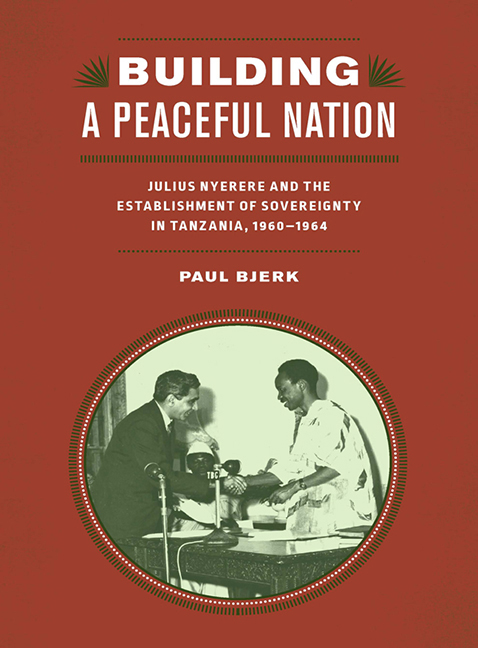 Building a Peaceful Nation
Building a Peaceful Nation Conclusion
Published online by Cambridge University Press: 08 May 2021
Summary
In 1961, what was our major ambition? Our major ambition was obviously to survive as a nation. We have survived as a nation, we have consolidated ourselves as a nation, and we have consolidated our independence… . Only as an independent country could we do such things as raising standards of living, increasing education, and so forth. Well I can't say we have achieved all we would have liked to achieve.
—Julius Nyerere, 1971Amidst innumerable ongoing challenges, the union with Zanzibar is still the most contentious issue that the Tanzanian state faces. A 2013 constitutional commission proposed an end to the “two-government” system put in place by the Union Treaty of 1964, to be replaced by a “three-government” system that would offer both Zanzibar and the mainland more autonomy under an overarching federal government. This is a response to continued complaints about the asymmetric union agreement and its enforcement by the ruling party. In 2000 and 2005 an opposition party, the Civic United Front (CUF), accused the ruling party of election fraud, while TANU's heir, Chama Cha Mapinduzi (CCM), accused CUF of campaigning to break up the Union. Violence and intimidation on the islands marred both elections. Throughout this period the two parties have endeavored to come to an agreement (“Muafaka”) to improve electoral machinery and institute a power-sharing government on the islands, a process that brought about a more tranquil, if no less contested, election in 2010. CUF never openly advocated secession, but the party has been outspoken in favor of autonomy in the recent constitutional debates. The cry for Zanzibari independence in recent years has been led by the Association for Islamic Mobilisation and Propagation (popularly known as Jumiki or Uamsho), which proclaims: “We want our country of Zanzibar and we want the full sovereignty of Zanzibar.” In the midst of this there is a religious tension between a mainland government that many Muslims see as dominated by Christians, and a Zanzibari opposition that many Christians consider too tolerant of Islamic fundamentalism.
This tension finds expression in opposing accounts of history, particularly that of the Union. Typical of old-guard members of Nyerere's government, Thabit Kombo defended the Union as a natural reunification and the continued defense of a people artificially separated by colonial borders and the slave regime of the former sultan.
- Type
- Chapter
- Information
- Building a Peaceful NationJulius Nyerere and the Establishment of Sovereignty in Tanzania, 1960–1964, pp. 255 - 270Publisher: Boydell & BrewerPrint publication year: 2015


